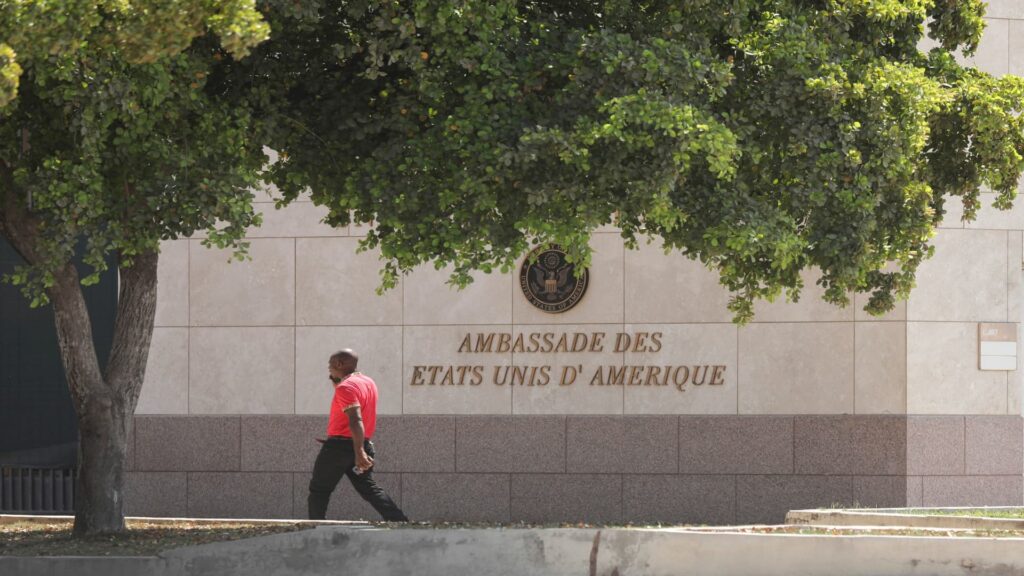The US military announced on Sunday that it had sent air forces to reinforce security at the US embassy in Haiti and allow non-essential employees to leave.
US Southern Command said the plane headed to the embassy compound, meaning helicopters were involved in the effort. She was careful to point out that “there were no Haitians on board the military plane.” The aim appears to be to quell any speculation that senior government officials might leave the country as gang attacks worsen in Haiti.
The neighborhood surrounding the embassy in the capital, Port-au-Prince, is largely controlled by gangs.
“This air transport of staff to and from the embassy is consistent with our standard practices for enhancing embassy security worldwide, and there were no Haitians on board the military aircraft,” Southcom’s statement said.
In many cases, non-essential staff can include diplomats' families, but the embassy had already ordered the departure of non-essential staff and all family members in July. Perhaps the staff transferred from the embassy were simply rotating, to be refreshed with new staff.
The statement issued Sunday said the United States remains focused on assisting Haitian police and arranging some type of UN-authorized security deployment. But those efforts have not succeeded so far.
Embattled Haitian Prime Minister Ariel Henry recently traveled to Kenya to press for the deployment of a UN-backed police force from the East African country to fight the gangs. But a Kenyan court ruled in January that such publication would be unconstitutional.
Henry, who faces calls to resign or form a transitional council, remains unable to return to his homeland. He arrived in Puerto Rico on Tuesday after being unable to land in the Dominican Republic, which borders Haiti.
On Saturday, the office of Dominican President Louis Abi Nader issued a statement saying, “Henry is not welcome in the Dominican Republic for safety reasons.” The Dominican Republic, which shares the island of Hispaniola with Haiti, closed its land borders.
“Given the current situation, the presence of the Haitian Prime Minister in the Dominican Republic is not considered appropriate,” the statement said, adding that “this decision reflects the firm position of the Dominican government to protect its national security and stability.”
The statement described the security situation in Haiti as “completely unsustainable” and said it “poses a direct threat to the safety and stability of the Dominican Republic.”
The statement expected that “the situation may deteriorate further if a peacekeeping force is not urgently sent to restore order.”
Caribbean leaders called an emergency meeting on Monday in Jamaica to discuss what they described as a “dangerous” situation in Haiti. They invited the United States, France, Canada, the United Nations and Brazil to attend the meeting.
Members of the Caricom regional trade bloc have been trying for months to persuade political actors in Haiti to agree to the formation of a comprehensive transitional unity government.
While regional leaders remain deeply engaged in trying to bring opposition parties and civil society groups together to form a unity government, “stakeholders are not yet where they need to be,” Caricom said on Friday.
“We are fully aware of the urgent need to reach consensus,” the statement said. “We have made it clear to the parties concerned that time is not on their side to agree on the way forward. From our reports, the situation on the ground remains dire and of grave concern to us.”
In February, Henry agreed to hold general elections by mid-2025, and the international community tried to find some foreign armed forces willing to fight gang violence there.
Caricom has also pushed Henry to announce a consensus power-sharing government in the meantime, but the prime minister has yet to do so even as Haitian opposition parties and civil society groups demand his resignation.
Henry, a neurosurgeon, was appointed Prime Minister of Haiti after the assassination of President Jovenel Moise in July 2021.
It is not clear whether Henry will be in Jamaica to attend the Caricom meeting.
In Port-au-Prince, police and palace guards worked on Saturday to reclaim some streets in the capital after gangs launched major attacks on at least three police stations.
National Palace guards, accompanied by an armored truck, tried to establish a security perimeter around one of the three stations in the city center after the police responded to an attack by gangs late on Friday.
Shooting continued sporadically on Saturday, with a woman writhing in pain on the sidewalk in downtown Port-au-Prince due to her gunshot wound after a stray bullet struck her in the leg.
Incessant gang attacks have paralyzed the country for more than a week and left it with dwindling supplies of basic goods. Officials in Haiti extended a state of emergency and a nightly curfew on Thursday as gangs continued to attack key state institutions.
But ordinary Haitians, many of whom have been forced from their homes by bloody street fighting, cannot wait. The problem the police face in securing government buildings is that many Haitians flock there in search of shelter.
“We are the ones who pay taxes, and we need shelter,” said a woman who did not give her name for safety reasons.
Another Port-au-Prince resident, who was not named, described Friday's attacks.
“They (the gangs) came with big weapons,” the man said. “We have no weapons and we cannot defend ourselves. All of us, the children, are suffering.”
